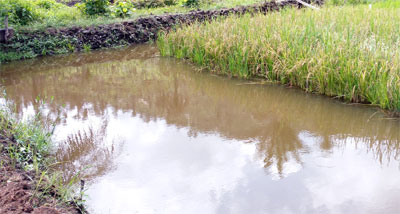Fish farming in Wet lands
 The inland fisheries and aquaculture contributes about 65 per cent of the total fish production of the country and growing fast over the years. Whereas, share of marine fisheries to the total fish production is dwindling over the years because of varied reasons like destruction of fish habitats in coastal areas, over fishing, pollution, lack of sustainable conservation measures, etc. In this context, inland fisheries and aquaculture holds the promise for further increasing fish production and productivity through vertical and horizontal expansion.
The inland fisheries and aquaculture contributes about 65 per cent of the total fish production of the country and growing fast over the years. Whereas, share of marine fisheries to the total fish production is dwindling over the years because of varied reasons like destruction of fish habitats in coastal areas, over fishing, pollution, lack of sustainable conservation measures, etc. In this context, inland fisheries and aquaculture holds the promise for further increasing fish production and productivity through vertical and horizontal expansion.
Scope for Fish farming in Wet lands
Wet lands can be suitably developed to construct ponds for fish farming. There is more demand for fresh live than preserved fish available in the market. The state fish Karimeen, Tilapia Red belly, Pungasius , Koi Anabusare having more demand by the consumers. The utilization of available wetlands for scientific fish culture would increase the fish production and doubling of farmer's income.
Our consultancy services for for Fish farming in Wet lands includes,
- Site Selection: Based on quality and texture of the soil, pH of soil, availability of quality water, access road, etc
- Pond Construction: The detailed layout plan of the pond is prepared by our technical persons which can also be submitted to bank along with the project report for loan facilities. The pond construction may be done by earth moving equipment i.e. proclaimer, Dumper/Tractor.
- Water Supply and Drainage Management: The tube well and pumping system may be arranged for water intake and exchange in the absence of perennial surface water supply. The drainage system should be designed carefully to prevent mixing of outlet water with incoming water.
- Farm Management: Pond Management plays a very important role in fish farming before and after the stocking of fish seed. Selection of healthy and good quality fingerlings, production of natural fish feed in the pond ecosystem (i.e. phyto-plankton and zoo-plankton)by alternative addition of adequate doses of organic manure and inorganic manure. Monitoring of water conditions, use of the supplementary feeding to get higher body weight in short period etc.Periodical monitoring of the stock for disease incidence and growth.






